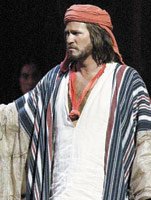That's Entertainment
Apparel companies cross into entertainment—to varying degrees of success
Max Azria said he has a “silent partner.” As producer of the stage musical “The Ten Commandments,” which opened Sept. 27 at the Kodak Theatre in Los Angeles, Azria has a partner who is not only silent but also invisible.
“A priest told me, ’You didn’t decide to produce “The Ten Commandments”—you were chosen,’” said Azria, laughing. “I’m just the UPS of God.”
The show, which stars Val Kilmer as Moses, has had a rocky journey. In the wake of mixed reviews, the show has cut back on the number of performances it stages each week while it revamps the production, which is scheduled to end on Oct. 31.
Azria is taking the negative reviews with the detached aplomb that show biz requires.
“Ultimately, it’s not about business,” he said in his gravelly voice. “It’s about a message that I hope can change people.”
Azria knew that success in musical theater might not come easy. The owner and founder of Vernon, Calif.–based BCBG Max Azria financed the show completely out of his personal pocket. He said the total amount was “much more” than a couple million dollars. (The show’s budget is reportedly $10 million to $15 million.) It was a sum, he admitted in an interview before the show’s opening, that was “90 percent negative risk.”
Azria said the story of Moses, not the opportunity to found BCBGMaxAzria Entertainment with Charles Cohen, was the motivation for producing the show. Azria spent three years developing the project, which is loosely based on a French production that had a successful run in Paris in 2000. Azria, who designed the costumes as well as oversaw all aspects of casting and production, said he believes “The Ten Commandments” is the first major musical to premiere in Los Angeles.
Though Azria used personal funds instead of company capital to underwrite the production, his project exemplifies a new stage in the evolution of fashion.
Fueled by the information age—the explosion of cable television, the Internet, DVDs and other digital media—the fashion and entertainment industries are increasingly becoming strange bedfellows poised either for mutual satisfaction or conjugal disaster.
“For 10 years, I’ve been saying that entertainment and fashion are one,” Azria said. “And for the past few years we’ve seen that the cover of fashion magazines is always someone from entertainment. The [primary] inspiration [for fashion] is Hollywood and music. It is the foundation of what are the trends and what we will do for the new season.”
Azria has no doubt that Los Angeles is the world’s fashion capital. It’s just that the city’s fashion is disseminated via film, television and music videos as opposed to couture-crawling catwalks. “And when you live in Los Angeles, you cannot think that you will never cross over into entertainment,” he observed.
When Tom Ford left Gucci Group N.V., intimating that his next challenge may be cutting film instead of fabric, some laughed at his ambition while others showed little doubt he could succeed. Miuccia Prada waded into the entertainment waters with Fondazione Prada, an artistic organization that sponsored a film festival Oct. 12–16 in Milan and a documentary project called “The Secret History of the Italian Cinema,” which screened at the Venice Film Festival. For several years, Ralph Lauren boasted a fledgling “RL TV” at www.polo.com.
Lights, camera, action
But the crossover from apparel to entertainment has been most successful within the surf and skate industries, where fashion and lifestyle are as in sync as a surfer and his board.
Brands such as Quiksilver have produced low-budget surf and skate videos for years. But now the stakes are rising—action- sports companies are venturing into feature film, television and publishing as well as garnering a plethora of corporate co-sponsors.
“We want to do things that grow the overall action- sports market,” said Matt Jacobson, vice president and co-founder of Quiksilver Entertainment. “Whether Quiksilver or Roxy is featured doesn’t matter as much. It’s an Intel or Dolby strategy. If we grow the lifestyle, the customers will come.”
Quiksilver Entertainment is a separate company created in 2002 by the Huntington Beach, Calif.–based action-sports apparel giant. Its first venture, a television show called “54321,” was co-produced and financed by the Fox Sports Network. Since then, Quiksilver Entertainment has built a diverse quiver of intellectual property and licenses as well as co-sponsors such as Sony Corp., Snapple Beverage Corp. and Nextel Communications Inc.
The company’s live-action projects include the MTV show “Surf Girls” and the critically acclaimed surf documentary “Riding Giants.” With publisher Harper Collins, Quiksilver developed the “Luna Bay” series of young-adult fiction.
In July, Quiksilver Entertainment, in partnership with punk-music distributor Epitaph, launched video distribution group Union to distribute actionsports films made by Quiksilver as well as its competitors. Union will give movies previously distributed through surf and skate shops access to such mega retailers as Best Buy Co. Inc., Circuit City Stores Inc. and Target Corp. Union’s first five titles hit the market on Oct.18.
Quiksilver Entertainment works closely with Quiksilver’s marketing department to ensure entertainment products present the appropriate image and allow the apparel brand to prosper. Jacobson said his company has two metrics for success: A project must grow the action-sports market, and it must be profitable.
Art and music
One area Quiksilver has not gone into is music. This is where Volcom is the big kahuna. In addition to producing surf and skate videos and sponsoring art shows, the Newport Beach, Calif.–based surf company maintains a separate division called Volcom Entertainment, which grooms up-andcoming bands, hosts music festivals, sponsors touring bands and boasts a record label.
Another company entering the entertainment field is Ocean Pacific Apparel Corp. of Irvine, Calif. Op, which emerged from bankruptcy 12 years ago, was eager to cash in on its revitalized apparel line as well as the riches of action-sports entertainment. The company was purchased this year by TheWarnaco Group Inc. of New York.
Launching entertainment products was almost mandatory, said Op spokesperson Alain Mazer.
“The culture of surfing is inextricably linked to music and entertainment,” Mazer said. “Getting the brand message out there is best done through entertainment media. Even conventional print advertising has to be entertaining.”
The company recently launched Op Emerging, a joint effort with Warner Bros. Entertainment Inc. and Fender Musical Instruments Corp. The project subsidizes a small tour of mostly unsigned bands displaying a relevance to California youth culture. Over 3,000 bands applied for the tour. On Sept. 21, a highlight album was released.
Like Volcom, Op also has sponsored small and large art shows, including an exhibit of surf culture in New York cosponsored by GQ magazine.
Mazer said he sees other action-sports companies as peers as much as competitors.
“If we all do what we do for the right reasons, then we’re all going to benefit,” he noted. “It’s remarkably true for the surf industry, which has tremendous appeal and the ability to influence global youth fashion. We’re all in the water together. Yes, we’re competitive, but the health of the category is dependent upon our all working together.”
























